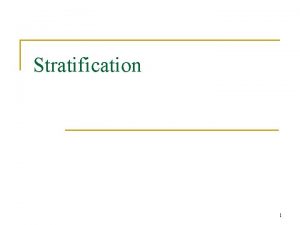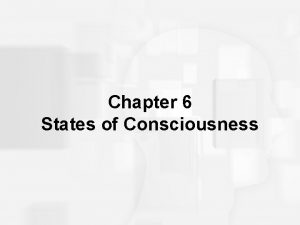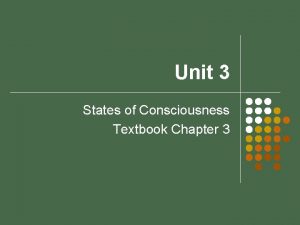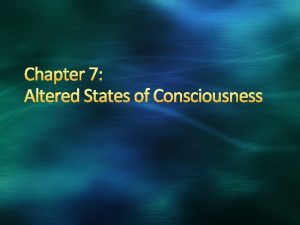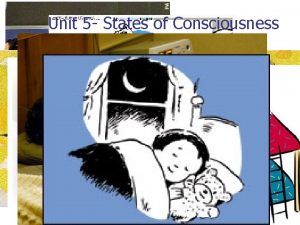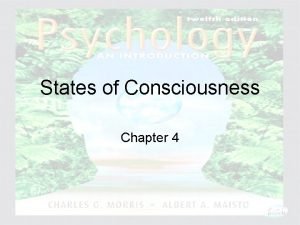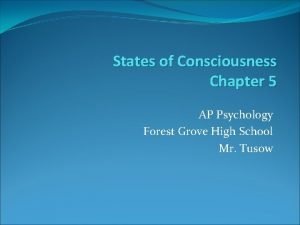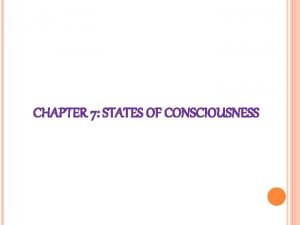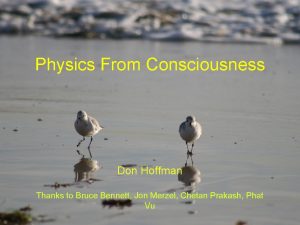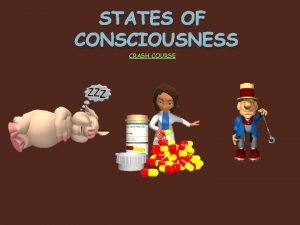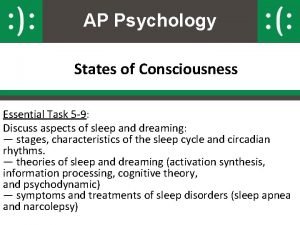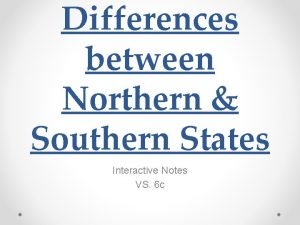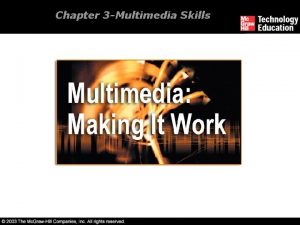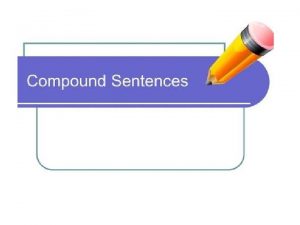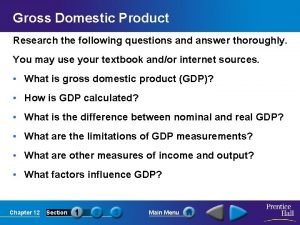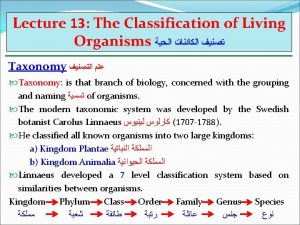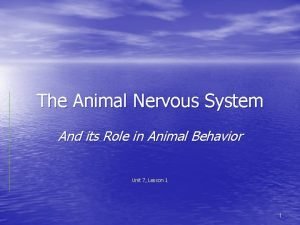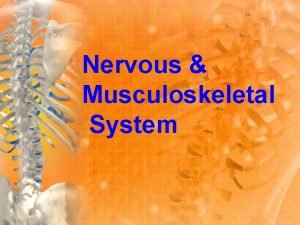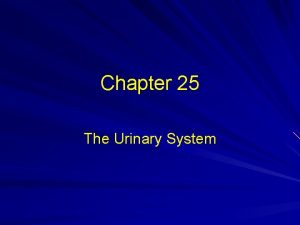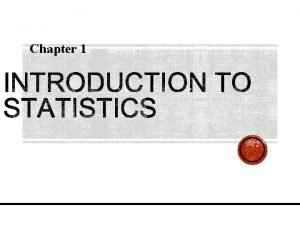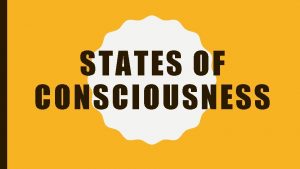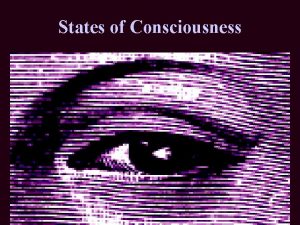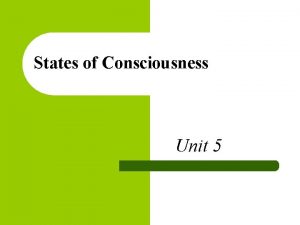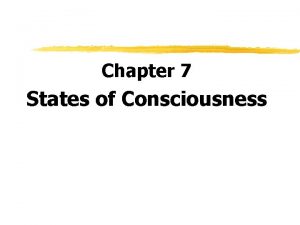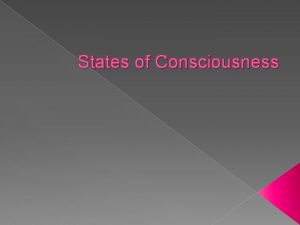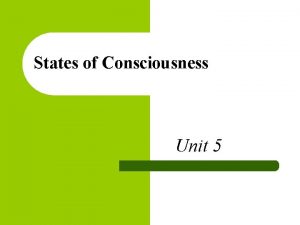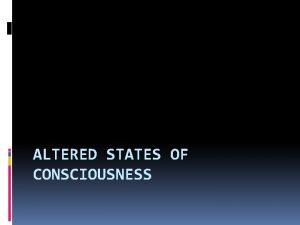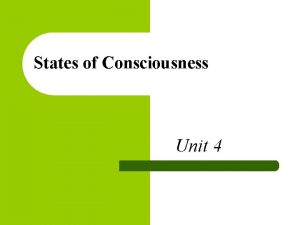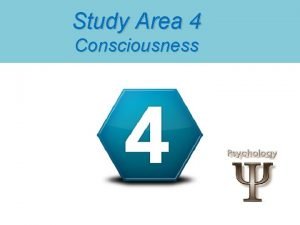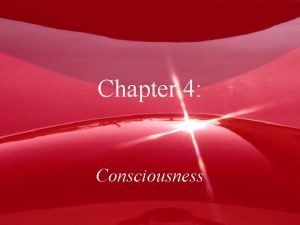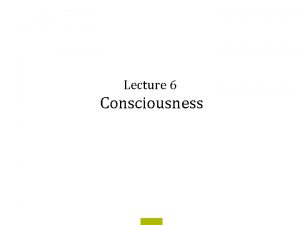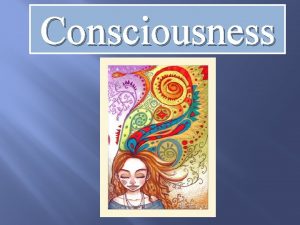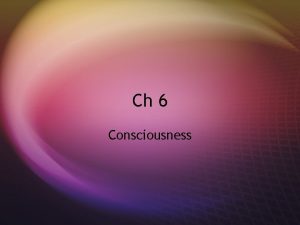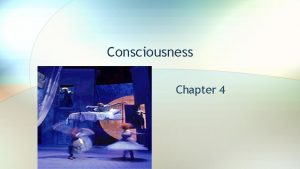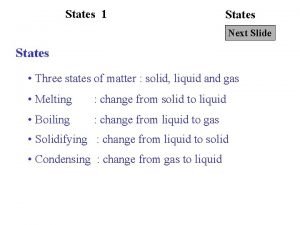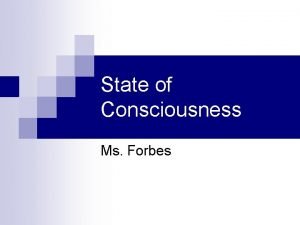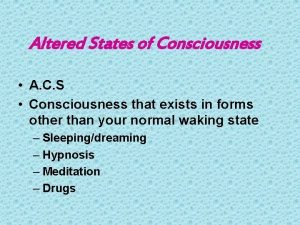States of Consciousness What is Consciousness Consciousness consists



























- Slides: 27

States of Consciousness

What is Consciousness? • Consciousness consists of all the sensations, perceptions, memories and feeling you are aware of. • Altered States of Consciousness

Levels of Consciousness • Based on Freud’s Psychodynamic Theory • Preconscious: Information that is not currently in consciousness but available to consciousness • Unconscious: Part of the mind that stores emotional memories, desires and feelings that could be harmful if brought to consciousness

Daydreams • A common variation of consciousness in which attention shifts to memories, expectations, desires or fantasies • Advantages include: – A way to escape – Prepare for future events – Aware of unfinished business – Increase creativity – Substitute for impulsive behavior

Who’s Paying Attention?

Biological Rhythms • Circadian Rhythms: periodic physiological fluctuations built into human beings that repeats approximately every 24 hours

Sleep’s Functions • Theories: • 1. Sleep protects • 2. Helps us recuperate • 3. Facilitates growth in babies

Sleep Deprivation

Sleep • Sleep: refers to the periodic, natural, reversible loss of consciousness. • Using an EEG, sleep researchers have shown the mind is “awake” during various stages of sleep.

Brain Waves and Stages of Sleep

Sleep Stages: Stage One (Light Sleep) • During Stage 1 sleep, your heart rate slows, breathing becomes irregular and experience hypnic jerks. • Slow Theta waves accompanied by fast Beta waves will appear on the EEG machine in Stage 1

Second Stage: Sleep Spindles • After about 5 minutes in stage 1 sleep, you delve into Stage 2 sleep which is characterized by – Sleep Spindles: bursts of rapid, rhythmic, brain wave activity. • Stage where you are clearly asleep. Sleep talking can occur in this stage or any other later stage.

Stages Three and Four • In these two stages the sleeper enters a progressively deeper state of relaxed sleep • The heart rate and breathing slows down at this stage. Brain waves also slow. • Deepest point of sleep occurs in Stage 4 • As stage 4 ends, the sleeper climbs back through the stages in reverse order

Stage Four: Deep Sleep • Stage when you are hard to awaken…but still aware of stimuli around you. This is due to a resurgence in electrical activity in the brain. • Stage at which children may wet the bed or sleep walk. • Also experience night terrors.

R. E. M. Sleep • R. E. M. : rapid eye movement sleep, stage where vivid dreams occur. Heart rate increases, Breathing more rapid, eyes dart behind lids. • R. E. M. sleep is now thought of as it’s own stage of sleep, between being awake and Stage 1 of sleep • NREM sleep occurs during the sleep stages, and this is a time where there are no dreams, or the dreams are not recalled as vividly as R. E. M. sleep

R. E. M. Sleep

Sleep Disorders • Insomnia: inability to fall asleep or stay asleep. • 10 -15 % of adults • Sleeping pills and alcohol might make it worse – Less REM sleep

Sleep Disorders • Sleep Apnea: sleep disorder characterized by a temporary stoppage of breathing during sleep and consequent momentary awakenings. • Often complained about as “snoring. ” • Often interrupts deep sleep stages leaving person feeling exhausted.

Dreams

What’s the Meaning Of Dreams? Depends Who You Ask! • Psychoanalytic Theorists like Freud will argue that dreams represent the royal road to the “unconscious. ” Dreams represent unresolved wishes/desires and discharge feelings that would be unacceptable if consciously voiced. – wish fulfillment – discharge otherwise unacceptable feelings • Manifest Content: represents remembered story line of a dream. • Latent Content: represents underlying meaning of dreams dealing with wishes and drives.

What’s The Meaning of Dreams? Depends Who You Ask! • Activation-Synthesis Theory: dreams begin with random electrical activation coming from the brain stem. Dreams, then, are the brain’s attempt to make sense of (synthesize) this random activity

ALTERED STATES OF CONSCIOUSNESS HYPNOSIS & MEDITATION

Hypnosis • Hypnosis- an altered • state of consciousness characterized by narrowed attention and increased suggestibility

Hypnosis Can anyone Experience Hypnosis? • It depends on the subject’s openness to suggestion

Hypnosis Can Hypnosis Enhance Recall of Forgotten Events? • Hypnosis does not help us recover “accurate memories as far back as birth” • Highly hypnotizable people are especially venerable to false memory suggestions

Is Hypnosis an Altered State of Consciousness Hypnosis as a social phenomenon • Behaviors produced through hypnotic procedures can also be produced without them • People do what is expected of them

MEDITATION • Is defined as a mental exercise for producing relaxation or heightened awareness • Meditation interrupts the typical flow of thoughts, worries and analysis. It helps to reduce stress, anxiety, tension, etc… • Evokes a Relaxation Response
 Class consciousness vs false consciousness
Class consciousness vs false consciousness Lesson quiz 7-1 altered states of consciousness
Lesson quiz 7-1 altered states of consciousness 3 states of consciousness
3 states of consciousness Chapter 7 altered states of consciousness
Chapter 7 altered states of consciousness Unit 5 states of consciousness answers
Unit 5 states of consciousness answers Ap psychology states of consciousness
Ap psychology states of consciousness Latent dreams definition
Latent dreams definition Chapter 7 states of consciousness
Chapter 7 states of consciousness Unit 5 states of consciousness
Unit 5 states of consciousness 7 states of consciousness
7 states of consciousness Crash course states of consciousness
Crash course states of consciousness Chapter 7 altered states of consciousness
Chapter 7 altered states of consciousness Ap psychology states of consciousness
Ap psychology states of consciousness What were the 11 free states
What were the 11 free states Big states vs small states guard against tyranny
Big states vs small states guard against tyranny Southern states of america
Southern states of america Roles and responsibilities of multimedia team
Roles and responsibilities of multimedia team A compound sentence consists of *
A compound sentence consists of * Gross domestic product in a closed economy consists of
Gross domestic product in a closed economy consists of White blood chapter 14
White blood chapter 14 Binomial nomenclature consists of two names *
Binomial nomenclature consists of two names * Peripheral nervous system consists of
Peripheral nervous system consists of Great britain parts
Great britain parts Autonomic nervous system consists of
Autonomic nervous system consists of Work study procedure
Work study procedure Marketing environments
Marketing environments The urinary system consists of
The urinary system consists of Level of measurement in statistics
Level of measurement in statistics
